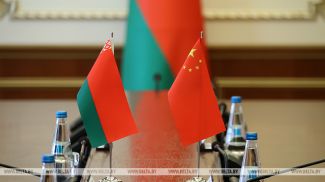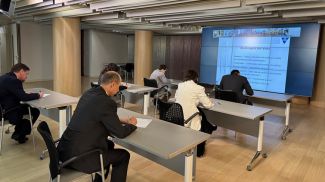MINSK, 2 October (BelTA) – Top officials of the Belarusian Internal Affairs Ministry and representatives of other government agencies met with UN Resident Coordinator in Belarus Joanna Kazana-Wisniowiecki in the ministry on 2 October, BelTA has learned.
Belarusian First Deputy Internal Affairs Minister, Chief of Criminal Police Gennady Kazakevich said: “In current circumstances and taking into account many years of fruitful cooperation we expect the UN office in Belarus to demonstrate a balanced and rational approach to the situation. We also count on assistance with encouraging various UN agencies to adequately recognize what is going on in Belarus.”
The meeting focused on the measures Belarusian law enforcement agencies are taking to stabilize the social and political situation in the country. Gennady Kazakevich said that ensuring public security is the key task for Belarusian police right now. The efforts are primarily focused on maintaining law and order, protecting lives, health, honor, rights and legal interests of citizens, interests of the society and the state from criminal infringements.
Gennady Kazakevich said that while Belarus definitely recognizes the UN's authority in ensuring international peace and security and highly appreciates the UN's coordination of international efforts in this field, Belarus is puzzled by the close attention various UN agencies and other international human rights organizations pay to the situation in the country. The official also mentioned that the agencies fail to objectively interpret the measures being taken in Belarus in order to stabilize the situation and prevent mass riots.
Gennady Kazakevich stressed that persistent attempts and consistent actions of Western countries to initiate the discussion of problems in Belarus at international platforms are aimed purely at enhancing their own positions and elevating their own significance.
Gennady Kazakevich expressed concern about the shift of international organizations from practical interaction with the Belarusian government towards the demonstration of their negative attitude to the human rights situation in Belarus.
During the meeting the UN resident coordinator watched a number of videos meant to debunk fake news about rapes and tortures committed by law enforcement personnel. Gennady Kazakevich cautioned against making rushed and incorrect conclusions about events in Belarus on the basis of uncreditable reports, which are circulated by mass media. “We are ready for the most open dialogue and for checking information about specific facts of violence,” he stated.
In turn, Joanna Kazana-Wisniowiecki expressed concern about the excessive use of force by law enforcement personnel during protest rallies and about the detention of reporters that cover such events. She said she believes Belarusian law enforcement agencies fail to provide sufficient information about the investigation of unlawful actions of their personnel.
Gennady Kazakevich responded by saying that the Investigative Committee of Belarus looks into every report about violence committed by law enforcement personnel, reports about torture and other kinds of cruel treatment of detainees. He noted that no facts like that had been confirmed. “It is important for us to have a thorough investigation into every fact like that. The results will be revealed to the general public. We invite you and heads of other UN agencies to inform us about specific facts of violence against specific individuals. We are ready to look into such reports and respond to them to the best of our authority,” the first deputy internal affairs minister concluded.













